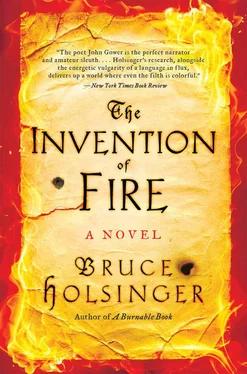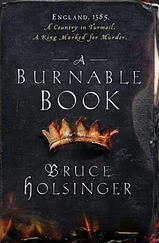Bruce Holsinger - The Invention of Fire
Здесь есть возможность читать онлайн «Bruce Holsinger - The Invention of Fire» — ознакомительный отрывок электронной книги совершенно бесплатно, а после прочтения отрывка купить полную версию. В некоторых случаях можно слушать аудио, скачать через торрент в формате fb2 и присутствует краткое содержание. Год выпуска: 2015, Издательство: HarperCollins, Жанр: Исторический детектив, на английском языке. Описание произведения, (предисловие) а так же отзывы посетителей доступны на портале библиотеки ЛибКат.
- Название:The Invention of Fire
- Автор:
- Издательство:HarperCollins
- Жанр:
- Год:2015
- ISBN:нет данных
- Рейтинг книги:3 / 5. Голосов: 1
-
Избранное:Добавить в избранное
- Отзывы:
-
Ваша оценка:
- 60
- 1
- 2
- 3
- 4
- 5
The Invention of Fire: краткое содержание, описание и аннотация
Предлагаем к чтению аннотацию, описание, краткое содержание или предисловие (зависит от того, что написал сам автор книги «The Invention of Fire»). Если вы не нашли необходимую информацию о книге — напишите в комментариях, мы постараемся отыскать её.
The Invention of Fire — читать онлайн ознакомительный отрывок
Ниже представлен текст книги, разбитый по страницам. Система сохранения места последней прочитанной страницы, позволяет с удобством читать онлайн бесплатно книгу «The Invention of Fire», без необходимости каждый раз заново искать на чём Вы остановились. Поставьте закладку, и сможете в любой момент перейти на страницу, на которой закончили чтение.
Интервал:
Закладка:
“ Oui, monsieur. I fought for King Philip at Crecy.” Beneath the man’s sorrow I heard a touch of pride in his voice. The Battle of Crecy had been fought some forty years before, near the beginning of this seemingly endless conflict between England and France. It represented the first use of gunpowder cannon by the English-bulky, inefficient ribalds, though they did good work, according to every account of the battle I had ever heard.
“And you are well familiar with the tactics of companies and brigades.”
“I am.”
“Then perhaps you might give me your thoughts on the guns.”
“Monsieur?”
“I have fired several of these-these canons de la main myself,” I said. “They are remarkably inefficient. Had all of those men been armed with longbows they would have slain twice the number of villagers.” Then I posed a question that I realized had been nagging me since visiting the woods with Chaucer. “Why would they attack with handgonnes, do you suppose?”
His eyes brightened with the challenge to his mind. He looked at the floor, thought for a long while, then gave a slow nod. “It was a trial,” he said.
“What’s that?”
“An assay is what it was,” said the old man, his gaze still on the floor but his nod strengthening. “They were testing their guns, weren’t they. Wanted to see how we would react, how we would dance in the fire of these new cannon.” Finally he looked up. “Whether we would fight back.”
An assay. What would a crowd of innocents do if a company of handgonners were to fire on them en masse, pin them against a wall? Had the assault in the Kentish wood also been a trial of sorts, a test of new weapons on the flesh and fear of eighteen prisoners? And-the more urgent question-were the assailants planning a third attack?
During our exchange I had noticed a young girl flitting around the yard, looking shyly through the two outer doors to the hall. Her eyes were shadowed, her face drawn. She seemed to want to enter the hall, though some hesitation or fear held her back.
“Who is the girl?” I asked one of the town guards after the old man had left.
He looked at me sadly. “An orphan now. Her parents went down in the shooting, there before the gate. She was up on the walls, along the parapet, when it all broke out, and saw two city guards taken down with arrows during the final approach. She says she was sent there by the leader of the squad just before the guns.”
“In sympathy?”
He raised a shoulder. “Perhaps, though several other children were slain in the firing.”
“I would like to speak with her if I may.”
He regarded me coldly. One of the Calais garrison, also in the hall, rebuked him. “Bring her in, or I will seize the little wench myself.”
The Desurennes man made no reply as he left to get the girl. She sat where the old man had sat. Her eyes, deep-set, darkened, puffed with weeping and lack of sleep, rolled aimlessly about as I observed her.
“You were there, demoiselle,” I began. “The day of guns.”
“Yes, sire,” she said. Her voice was tinny, high and sweet like a sacring bell.
“And what are you called, my young lady?”
“I am Iseult.”
“A meaningful name,” I said gently. “It may help you find your Tristram when the day comes.”
“I have already found him, sire. He died at the market, like a dog,” she said, her voice going flat as a pond. “I saw him give the ghost there, bleeding on the ground.”
“Will you tell me about it, Iseult? Tell me what you saw?”
She twisted her lips into a sad pout, her eyes darkening, though her voice stayed eerily calm while she spoke. “Mostly his neck, when the thing went in. A ball, they said it was, afterwards. But when I saw it I thought it was a garland. Was like a blooming rose round about his neck, spread out in this deep, bright red, like a ruby necklace circling his collar. Did you make that necklace for me, my king? For it is a beautiful necklace, sire.”
Her mouth widened as she grasped what she had said. She brought her palms to her face, then started to beat and tear violently at her eyes. I reached forward and took her wrists, thin as sticks, and pulled her arms away from her face. She shook her head in a rage, and I held her until she was becalmed and still. Her shoulders heaved; weak chokes escaped from a small and delicate mouth.
A woman appeared in the doorway. I gestured her away.
“Do not cast out your eyes, Iseult,” I said to the girl. “Our eyes are our windows to God, and to the world He has made. They are one of our greatest gifts. Go gentle on your eyes, Iseult.” I let that calm her for a little while, then, when her breathing had slowed, I spoke again. “Please, Iseult, for the sake of your Tristram, and of your poor mother and father. Tell me what you saw.”
She told me, sparing no details. The cracks of the guns, the whizzing of the balls through the air, the puffs of sound as they struck flesh and stone, the stink of powder and death. A dark magic in her child’s mind.
“Now I need the testimony of your ears,” I said when she had finished. “Iseult, listen to me. I know from the monsieur there that you approached the men on the hill. That you spoke to one of them, and that he spoke to you. Was there anything he said to you, any words you could comprehend?”
She shook her little head. “He seemed a nice man. He showed me his birds.”
“His birds?”
“ Oui, sire,” she said, and her eyes recovered a gleam. “There was one thing he said to me, and in my own tongue. I had forgotten but now I recall it. He said, ‘Do you like swans, little mother?’ And he showed me the swans on his arm.” She looked up at me, and I felt the pulse quicken in her tiny wrists. “Two great white swans they were. Like this.”
She thrust out her elbows, feigning the busy flapping of a bird’s wings. Then she encircled her neck with her hands. “Those swans, they were choked with gold, sire.”
The Bohun swan, doubled and gorged. The household badge of Thomas of Woodstock, Duke of Gloucester, a mark of his affinity and familia .
“And was there anything else?”
“Swans again,” she murmured. “The last thing the man said to me before I went to the wall.”
“What was it, Iseult?” I leaned in toward her, not wanting the guards by the door to hear her reply.
Her eyes lost their focus as her mouth curled into the saddest of smiles. “ Rappelez-vous les cygnes , petite mere, ” she said.
Remember the swans, little mother.
Chapter 32
"Marsh. Stephen Marsh.”
He heard his name again, then the clap of hands.
“Marsh, you must come awake.”
The priest, back to trouble him for coins. Stephen rolled onto his side and dug his knuckles into his eyes. The straw pallet had lost all its softness over the days of his confinement, the chapel’s stone floor any trace of warmth with the coming of the autumn chill. A thin blanket was all he had for covering, so he’d kept everything on for bed, even his tunic. Not only his joints but also his clothing fought against him when he sat up to stretch away the sleep. Two dogs traded muffled barks somewhere outside, and a thin ray of morning light caught dust before the faded paintings on the chapel’s western wall.
“Coming, Father,” Stephen called to the priest.
He struggled to his feet and went to the curtain, drawn across the narrow entryway to the disused chapel to shield the ugly bedding from parishioners. The chamber functioned as makeshift lodging for the occasional undistinguished visitor: a family member of a rectory servant, a seeker of sanctuary like him, a vagrant on a cold night with a few coins to spare the parson. Stephen was the parish’s only boarder at the moment, and the parson let him have his peace for the most part in this period of forced confinement. Stephen had spent the first of these days idling about the church, then started to help the priest with some minor fabric repairs in exchange for his keep, a broken hinge on the screen gate, a few bent nails in the benches, his tools having been sent over by an apprentice from Stone’s.
Читать дальшеИнтервал:
Закладка:
Похожие книги на «The Invention of Fire»
Представляем Вашему вниманию похожие книги на «The Invention of Fire» списком для выбора. Мы отобрали схожую по названию и смыслу литературу в надежде предоставить читателям больше вариантов отыскать новые, интересные, ещё непрочитанные произведения.
Обсуждение, отзывы о книге «The Invention of Fire» и просто собственные мнения читателей. Оставьте ваши комментарии, напишите, что Вы думаете о произведении, его смысле или главных героях. Укажите что конкретно понравилось, а что нет, и почему Вы так считаете.












